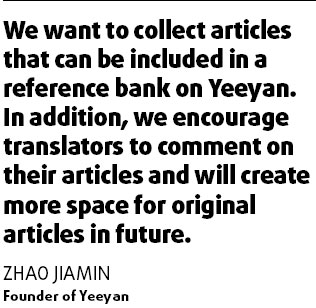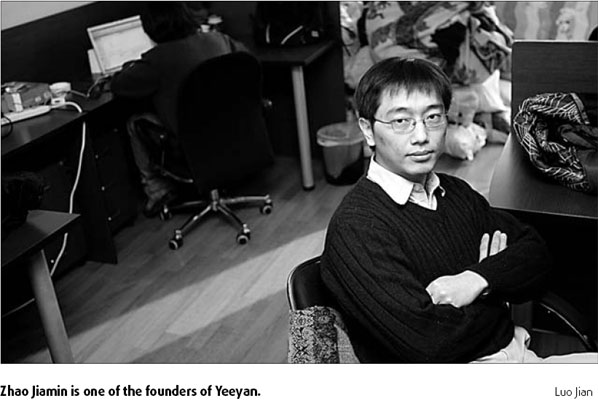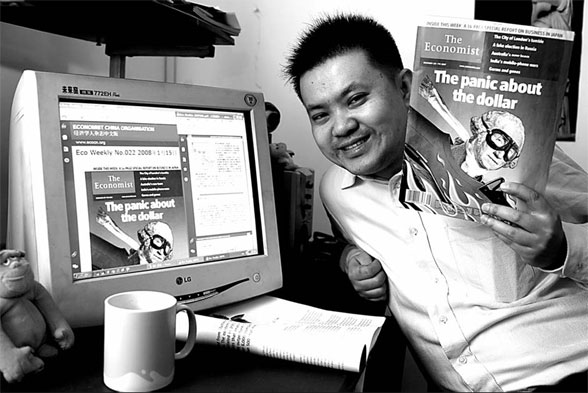A window to the world
|
For Shi Yi, a 37-year-old insurance broker, the Economist magazine is the prime motivation for his voluntary translation website. Courtesy of Sanlian Life Weekly |
Every day, 26-year-old Li Yanbo spends one or two hours translating English articles from the Internet. He then posts his translations on www.yeeyan.com, a website which says its aim is to "discover, translate and read the essence of the Internet world in non-Chinese languages".
Li usually reads and translates articles on the subject that interests him the most - how to start and build one's own business - and posts his translations on a Yeeyan link called "Go It Alone", named after a book by Bruce Judson on the same subject. Li has also translated the book into Chinese and posted it on Yeeyan.
"Many people of my generation dream of starting their own business, but there are hardly any books about such experiences in China," says Li, who works for a foreign trade company. "I read Go It Alone on the Internet and found it very useful. When I recommended the book to my friends, some of them were not able to read it in English, so I decided to translate it."
When Li posted the chapters he had translated on Yeeyan, they aroused much interest with readers asking for more. Encouraged by this response, he kept up with his translations and was finished the whole book in 2007.
Though Li is yet to find a publishing house to release his translation, he says he enjoyed the work. "People of my generation want to share," he says.

Yeeyan has more than 400 links put together by voluntary translators. Most deal with economy and technology, but there are some that touch on social themes.
For example, Shi Beichen, a 23-year-old student of Tianjin University of Commerce, has started "Society and Social Issues" and "China In Foreigners' Eyes".
"On the Internet, there is much more information in English than in Chinese. If we don't get this information, we will be left behind," Shi says.
It is this same belief that drove Zhao Jiamin, Zhang Lei and Ding Ding, three Tsinghua University graduates, to found Yeeyan in December 2006 when they were working in Silicon Valley in the United States.
"We found that on the Internet information in Chinese and English was not equally balanced. At that time, we three also wanted to do something of our own, so we decided to establish Yeeyan," says the 35-year-old Zhao, who came back to China last year and now works full-time for Yeeyan.
The founders of Yeeyan say improving the quality of voluntary translation is a key problem. To alleviate this, they plan to introduce the "wiki" format, under which translators can translate as well as edit articles.
According to Zhao, there are some 2,000 voluntary translators at Yeeyan, who live throughout China and in other countries.
Besides exchanging information on the Internet, 20 members of Yeeyan also worked together to translate Inside Facebook, a book by Karel Baloun, one of the creators of www.facebook.com. With each person translating one part, they finished the book bearing the credit of the Yeeyan website. With authorization from the original copyright holder, the Chinese version of the book was published in November 2007 by the China Book Press.
"We want to collect articles that can be included in a reference bank on Yeeyan. In addition, we encourage translators to comment on their articles and will create more space for original articles in future," Zhao says.
According to "The 21st Statistical Survey Report on the Internet Development in China" by the China Internet Network Information Center (CNNIC), China's online community touched 210 million at the end of 2007. This ranks second only to the United States which has 5 million more users. CNNIC estimates that China will have the largest online community by the end of this year.
As more foreign cultural products become available on the Internet, the number of voluntary translators in China is also growing. Some work on the subtitles of foreign films and TV series and some on terms specific to some online games.
But for Shi Yi, a 37-year-old insurance broker, it is the Economist magazine that is his prime motivation.
He says the Economist became his favorite magazine when he studied in the UK seven years ago, because he liked the short length and dry humor of its articles. In May 2006, he founded a website for the voluntary translation of the magazine: http://www.ecocn.org/forum.
It soon began to draw more people with a similar interest. They donate money to pay for the server of the website, and post their translations of articles from the magazine on the forum. Every two weeks, they release a collection of articles translated from the past two issues in PDF-format.
Chen Jilong, a post-graduate student of medicine at the Southeast University, is one of the main voices on the forum.
Chen began to translate articles from the Economist in 2004, when he was preparing for the entrance examination for post-graduate study, and learned that articles from the magazine often appeared in the English examination.
"I don't like to study English only for the sake of the language, but want to expand my knowledge while studying English," he says.
Since then, he has been translating articles from the Economist, and discussing his works with others at the forum. He has already posted more than 100 translated articles, including those on the arts, technology and politics.
"All the translators at the forum are driven by interest, and there is no commercial profit involved," says Shi Yi.
Shi also says they hope to formalize their translation, and wish to get in touch with the Economist to see whether some form of cooperation is possible.
Jin Yan, a news assistant with the the Beijing branch of the Economist, says she has been to the Ecocn forum and comments that it is "not bad for a English-learning website", but adds that cooperation will depend on the magazine's head office in London.
In comparison, Yeeyan has clearer commercial goals. Zhao left behind a $100,000 a year salary in the United States to come back to China for Yeeyan, but believes it is worth trying.
Although Yeeyan did not make break even with the publication of Inside Facebook, Zhao says they will explore the opportunities for copyright dealership and on-line distribution. Yeeyan will also pay professional translators to release their works on the website, but the forum for voluntary translators will always be there, he says.
Yeeyan has also built an English website: http://en.yeeyan.com, in which English translations of Chinese articles are posted to provide more information about China to the world.
"We are not certain of our future profit mode yet, but we are sure that we are doing very meaningful work," says Zhao.
Sanlian Life Weekly contributed to this story

(China Daily 04/02/2008 page20)















